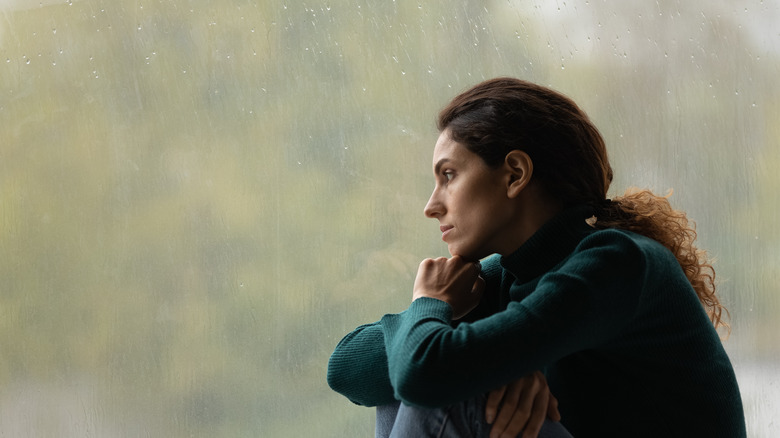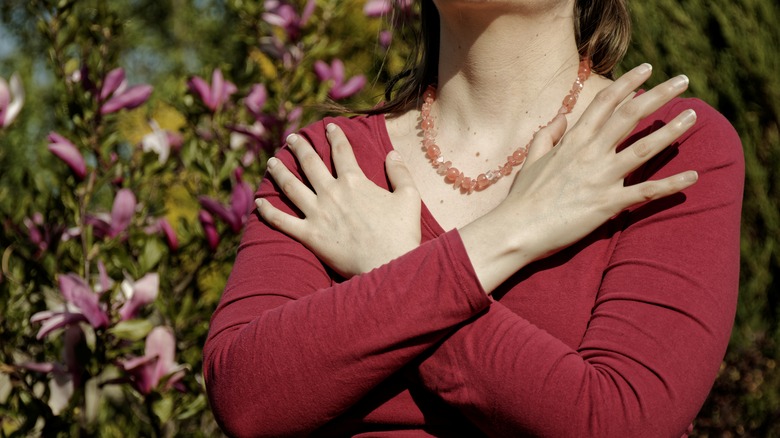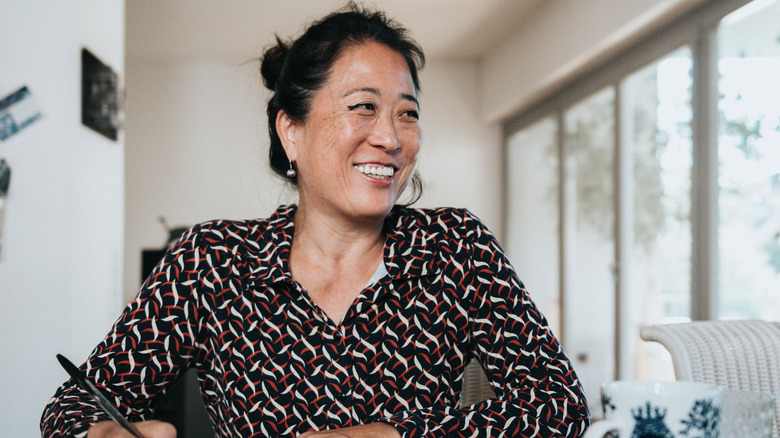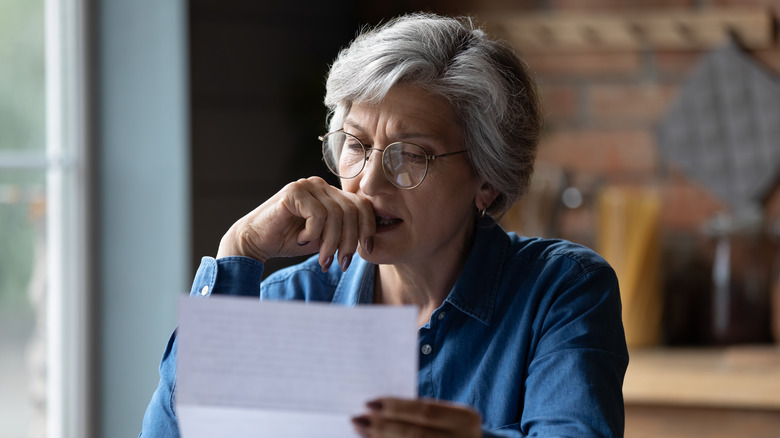We Spoke To 7 People Who Found Healing Through Mothering Themselves
While some people look forward to Mother's Day so they can surprise their mom with a weekly call, treat her to brunch at a fancy restaurant, or bring her a card and flowers, others have a much more fraught relationship with the holiday. For those who are still navigating the stormy waters of a broken or strained relationship with their mom, the holiday can be particularly triggering for negative feelings. The same holds true for those who lost their mothers. There is a myriad of complexities in the relationships one can have with their mother, but what happens when that includes grief? And in that grief, what if the relationship was complicated, or estranged?
The important thing to remember is your feelings are valid, no matter how complicated they are. Whether you've lost your mother through death or estrangement, or if they've always been around, but the relationship is fraught, it's okay to give yourself space to grieve. There is no one-size-fits all approach to how a person is supposed to heal.
To highlight how unique and complex each experience is, Women.com reached out to readers to share their own experiences of learning to heal themselves following the loss of their own mothers.
They became someone their mom would be proud of
Sunica, 26, lost her mom to cancer when she was just 12 years old and said it was a defining moment in her life. She told Women.com she found it particularly difficult during the grieving process when she would mistake other women for her mom who may have had striking similarities to her. She claimed those encounters, "would momentarily fill me with a sense of hope, only to be quickly followed by the crushing realization that she was truly gone."
Sunica said that during one morning, she looked in the mirror and had a revelation that changed her life. Noticing how much she resembled her mom, she said, "I am the most important living connection to her in this world. As long as I am alive, a part of her blood and DNA will continue to live on...This realization became the driving force behind my healing journey."
From then on, Sunica explained she wanted to become someone who would make her mom proud. "I wanted to ensure that her legacy remained strong in this world, and I wanted everyone to know that she had a great daughter who loved her deeply. This newfound purpose helped me find strength and resilience in the face of adversity," she said.
She honored her mother by nurturing herself in the same way
Sarah is the co-founder of Parental Queries, a website that helps parents deal with all the most important day-to-day questions they have. She lost her mom at the age of 19, and though she felt lost at the time and struggled to cope with such profound grief, she found a unique way to honor her mother in her day-to-day life. She tells Women.com that she began taking care of herself in the ways her mother previously did, including "managing finances, planning meals, and shopping responsibly." She added that caring for herself was a way to honor her mother, saying, "It felt strange at first, but with time I found great pride in taking care of myself. It was my way of honoring my mother and learning how to heal from the pain of her loss."
Reflecting on a memory of bursting into tears at the grocery store one day, she claims it also filled her with a sense of peace. She said she found it empowering when she realized she could care for herself and be independent. "I had gone from someone who needed my mother's help to someone who could now provide for themselves and care for their needs. It felt like liberation, almost—like a way of honoring her memory."
Sarah admits that mothering ourselves is not easy, and it definitely isn't. However, she emphasizes that learning to care for ourselves the same way a nurturing mother would can not only lead to more self-love but a sense of confidence as well.
She found purpose through creating an organization to help other people
Shameka tells Women.com she lost her mom in her early 20s and went through an unstable period characterized by several bad habits including addiction and suicide attempts. However, after going through depression and feeling upset that her son would grow up without his grandmother, she stopped fighting. After coming to the realization there was nothing she could do to change the circumstances, she founded the organization Those Without Mothers.
Those Without Mothers is a supportive community based on the idea that "no one should have to face grief alone." It provides support and resources to women who have lost their mothers, as well as a community of individuals who share the same experience. Shameka told Women.com that working with women who have been through the same thing as she was transformative for her healing. "Working with those who have lost their mothers has merged into my passion for people and my love for empowering hope," she shared.
Shameka adds that she eventually found the silver lining in her grief, noting that the loss has given her a sense of purpose. "We often see loss as a negative thing, but I believe this loss was tied to my purpose. I never want others to go down the paths that I did, or feel the guilt and shame that I have. Healing for me was found in serving other women," she concluded.
She got support through different types of therapy
Donna, 71, shares with Women.com how a strained relationship with your mother can make the grieving process doubly complicated, even after their death. She reveals that she grew up in an abusive household, and "suffered from insomnia, depression, and relentless flashbacks of abuse scenes that played in staccato loops in my mind."
She shared that she spent eight years working with a therapist who utilized EMDR therapy, which stands for Eye Movement Desensitisation and Reprocessing, and if the name sounds familiar it's because it's the same therapy that Prince Harry was seen using during an interview on Good Morning America. According to the British Association for Counselling and Psychotherapy, this therapy involves stimulating your brain from left to right with eye movement, sounds, or tapping, and it's supposed to simulate REM sleep which helps patients access their subconscious.
Donna later talked about meeting a friend on a flight who became like her surrogate mother and reconnected with her musical roots in a bid to get her life back on track. She said, "My life is now very fulfilling, and I have learned that loss can indeed be empowering and motivating to make the choice to live life to its fullest rather than succumb to despair."
She transformed herself into someone more positive like her mom
Denise tells Women.com she lost her mom to heart failure when she was just 18 which left her feeling completely lost as she had always relied on her mom for emotional support. She recalls her childhood as being marked by a desire to always be around her mom, a social butterfly who loved to play pranks on people. She emphasizes that she was the exact opposite.
Denise tells Women she relied so heavily on her mom that she didn't create any other meaningful relationships, saying, "I told myself I didn't need friends because I had my mother...until I didn't." Claiming she had a reclusive personality, after losing her mom, Denise made a vow that she would change. She made it a goal for herself to make her mother proud and set about trying to self-guide herself through all the issues daughters should be able to ask their mothers.
Denise told us that if someone told her she would become the person she is now, she wouldn't believe them in a million years. She wants to become someone her mother would be proud of, saying "A person who loves god, loves to smile, and who sees the best in every situation and person. I even won a company award for my relentless positivity, this was the same girl who, in her teens would have to be medicated for anger and depression that could only be soothed by long midnight talks with mom."
She became a surrogate mother to her students
Carol, 73, shares with Women.com that she had a tough upbringing after growing up with a mother who suffered from mental health issues, staying in multiple foster homes, and having to live with an aunt who was cruel to her. Her aunt would tell her she had a mother who didn't care about her and threatened to call welfare. "As such, I grew up feeling alone and unloved," she says. Though her aunt could be cruel to her, Carol says she learned some positive traits from her, like being independent.
Carol adds that she wanted to channel her love into a daughter of her own, but unfortunately suffered a miscarriage and other unknown health issues that killed that dream. Rather than allow her circumstances to bring her down, Carol took up a career in teaching and counseling. These served as an outlet for her to channel all her motherly, nurturing energy into her husband and students.
She concluded, "Today I have several young adults who fondly call me their 'mother figure,' 'god-mommy' their 'second mom' their 'play mom' etc. Where I receive Mother's Day cards, calls, and texts. Where I never felt loved growing up, today I feel truly loved."
She wrote her mother an honest letter about how she felt
Sometimes, having an honest conversation with our mother before she dies can lead to healing, regardless of her response. With that said, getting some space from her can also be one of the best things you ever do, however, this can lead to a complicated grieving process when she passes away. Paulette, 64, shares that she experienced an abusive childhood with alcoholic parents and notes that she was longing for simple affection throughout her upbringing. She said, "My mom never held, touched, comforted, kissed, or told me she loved me." She herself developed an addiction to alcohol later in life and used this as fuel for her fifth book.
Wanting to express her feelings to her mother, Paulette says she wrote her a letter, telling Women.com, "Through a hard, but necessary circumstance that occurred in my 50s, I cut off ties with my mom for about three weeks after writing her a long letter explaining how much her absence harmed me both as a child and grown woman."
This honest communication lead to a conversation and a reconciliation of sorts that allowed them to have a real relationship. After that, they were able to stay in contact and maintain relatively close ties for 10 years before her mother passed away at the age of 77.







